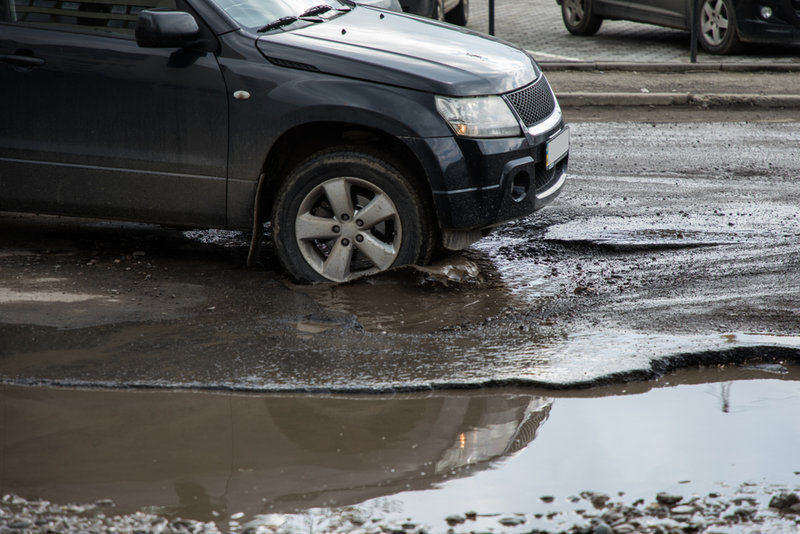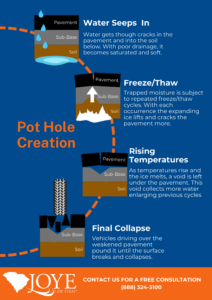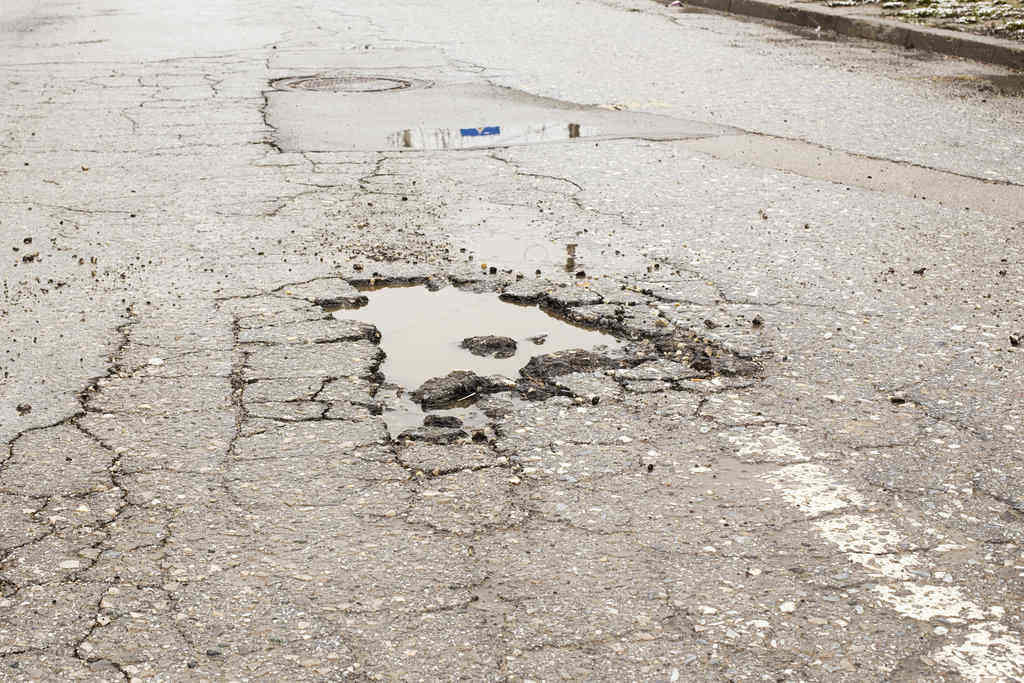
You might have noticed road crews fixing potholes on highways in places like Columbia, Charleston, Myrtle Beach, and beyond. It’s a familiar sight for travelers in South Carolina, and it’s not going away anytime soon.
Although the South Carolina Department of Transportation (SCDOT) has actively worked toward improving the pothole situation in recent years, South Carolina recently ranked 15th in the nation for states with the worst pothole issues.
These road craters are more than a bump in the road or a momentary dip in an otherwise flat roadway. Potholes across South Carolina are a nuisance; they continue to cause serious damage to vehicles and contribute to car accidents that could have been prevented.
After an accident caused by a poorly maintained road, it’s important to contact our South Carolina car accident lawyers for a free consultation. In the meantime, read on to learn more about the pothole problem in South Carolina.
What Causes So Many Potholes in South Carolina?
Most South Carolina drivers have had the bone-rattling experience of hitting a deep pothole, and are all too familiar with the sickly feeling that comes with wondering if it caused damage. Sadly, South Carolina is notorious for its poor performance when it comes to road maintenance. A recent study rated South Carolina roads among some of the worst in the nation. They noted that S.C. roads were bumpy and pocked by potholes.
Potholes form because of wear and tear, and are aided by the destructive force of water. As water freezes in cold weather, it expands, which causes cracks and other breaks in pavement. These gaps let more water in, which weakens asphalt and the ground underneath roadways, and increases freeze-and-thaw breakage. 
The areas most prone to pothole development are those where drainage is poor (particularly where roads dip) and vehicular traffic is heavy. Poor maintenance can also allow small fissures in pavement or asphalt to deteriorate further.
Much of South Carolina is prone to flooding from heavy rains and coastal storm surges. Floods and rushing water can cause weaken and damage road surfaces.
Road maintenance is key, but that costs money. According to Pothole.info, the National Surface Transportation Policy and Revenue Study Commission of the U.S. Congress said more than a decade ago that the annual investment required to maintain the nation’s highways, roads, and bridges was estimated to be $185 billion per year for the next 50 years.
The 12-cent gas tax hike that South Carolina leaders approved back in 2017 and phased in over the course of six years has generated over $4.1 billion towards road and bridge work through the Infrastructure Maintenance Trust Fund (IMTF). The majority of those funds (just under $3.5 billion) has gone to paving projects.
South Carolina Transportation Secretary Christy Hall said that South Carolina had $11 billion worth of pavement needs as a result of 30 years of backlogged maintenance.
Although work is underway, the backlog of maintenance leaves us with a few years’ worth of road repairs still to go as part of the 10-year road improvement project initiated with the Roads Bill passed in 2017. For the foreseeable future, South Carolina drivers and visitors will need to be extra vigilant when driving on our pothole-riddled roads.
Preventing Pothole Damage: Tips for Drivers
Nothing is as jarring as driving along peacefully and hitting a giant road crater. They can also pose a serious threat to you, your passengers, and your vehicle’s wheels, tires, and suspension. Striking a pothole can cause drivers to lose control of their vehicle, or cause their vehicle to stall in the middle of the road, increasing the risk of a collision.
Luckily, there are some smart driving habits you can employ that can significantly reduce your chances of pothole-related damage and injury.
Here are some tips to help you traverse South Carolina’s pothole-riddled roads with more ease and confidence:
- Stay alert and scan the road ahead: The key to avoiding potholes is spotting them early. If you maintain a safe following distance and pay close attention to the road surface, you can usually avoid contact with potholes. It’s especially important to remain aware after periods of heavy rain or freeze-thaw cycles when potholes tend to worsen.
- Slow down and maintain a safe speed: Speed is not your friend when it comes to potholes. Hitting a pothole at high speeds can cause serious damage and possibly cause accidents involving other vehicles. Adjust your speed according to these road conditions and be prepared to slow down or brake if you encounter an unexpected pothole.
- Don’t swerve sharply: Your instinct might be to swerve quickly to avoid a pothole, but this can be dangerous and lead to a loss of control or leaving your lane. If you can safely brake and maneuver around the pothole, do so carefully. If you swerve into oncoming traffic or off the road altogether, it is far riskier than just hitting the pothole.
- Maintain proper tire pressure: Checking and maintaining your tire pressure on a regular basis is important should you hit a pothole. Underinflated tires are more susceptible to sustaining damage from potholes. Check your owner’s manual for the recommended tire pressure for your car, and make sure to check it at least once a month and before any long road trips.
- Increase your following distance: Giving yourself extra space between your car and the vehicle in front allows more reaction time to spot and avoid potholes. This increased following distance also provides a buffer if the car ahead brakes suddenly to avoid a pothole.
- Use caution when driving in unfamiliar areas: If you’re driving in an area you’re not familiar with, be extra alert. Roads with a history of potholes are more likely to have them again. If possible, try to avoid areas known for pothole problems.
 Report potholes to the proper authorities: It’s important to help maintain safe roads for everyone. Report any large or hazardous potholes to the appropriate local or state department so they can be repaired promptly. Simply taking a few minutes of your time to report these hazards could save lives. Visit the South Carolina Department of Transportation’s (SCDOT) website to report a pothole.
Report potholes to the proper authorities: It’s important to help maintain safe roads for everyone. Report any large or hazardous potholes to the appropriate local or state department so they can be repaired promptly. Simply taking a few minutes of your time to report these hazards could save lives. Visit the South Carolina Department of Transportation’s (SCDOT) website to report a pothole.
How to File a Pothole Damage or Injury Claim
The AAA Auto Club explains that hitting a pothole can damage a car’s tires, wheels, shocks and struts, tie rods, ball joints, and more. Pothole-related auto repair costs average $406, but some unfortunate drivers wind up paying thousands to fix the damage.
If your vehicle has been damaged by hitting a pothole in South Carolina, you can file a claim seeking compensation from the S.C. Department of Transportation. Because of the delay in processing claims, in most cases, car owners will need to pay to have repairs done, and then seek reimbursement.
Obtain a damage claim form from SCDOT online. Submit it along with two repair estimates or a paid invoice to the SCDOT Maintenance Office in the county where the incident occurred.
The person filing the claim must be the registered vehicle owner and a copy of the vehicle registration must be included with the claim form. A vehicle owner has one year from the date of the pothole accident to file a damage claim. Under the South Carolina Tort Claims Act (Section 15-78-10), the SCDOT or its insurance carrier has 180 days after a claim is received to decide whether to pay or deny the claim.
In addition to vehicle registration and insurance information, the damage claim form requires the date and time of the accident, the location of the pothole, and a description of the accident and the damage caused. It also asks for the names of any witnesses to the accident.
The problem goes further than vehicle damage, though. Hitting a pothole – or trying to avoid one – can cause a driver to swerve suddenly or lose control of the vehicle and crash. A blown tire or broken suspension from a pothole can also lead to a car accident.
You can also seek compensation from SCDOT for injuries suffered in a pothole-related car accident. Between 2020 and 2022, South Carolina paid a total of more than $1.17 million in claims for personal injury and vehicle damage caused by the state’s failing roads, according to SCDOT figures.
Contact a South Carolina Car Accident Lawyer About a Pothole Claim
South Carolina has what looks like an easy process for obtaining reimbursement for pothole-related vehicle damage or injury, but SCDOT still doesn’t reimburse drivers for a majority of the claims they receive.
SCDOT spokesman Pete Poore said the agency typically pays out about 40 percent of submitted claims, according to the report. If the road where the accident happened is maintained by an entity other than the state, the SCDOT will deny the claim and tell the claimant where to file again.
Joye Law Firm Injury Lawyers will press for full compensation for you if you have been injured because of a South Carolina pothole accident. We’ll do the research to ensure your claim is filed properly. Having our experienced S.C. car accident lawyers at Joye Law Firm Injury Lawyers working on your behalf means that we will handle the claims process, so you can focus on your recovery and health.
Contact us at (888) 324-3100 or use this online contact form to get a free case review today. We help clients with car accident cases anywhere in South Carolina. Our offices are located in Columbia, Myrtle Beach, North Charleston, Clinton, and Summerville; We are available to answer your questions online or by phone 24/7.
Originally published January 15, 2020, revised May 24, 2024.


































